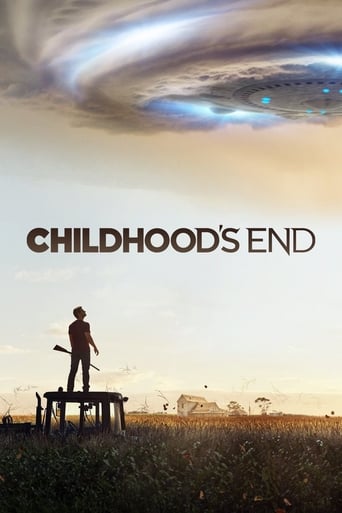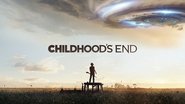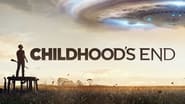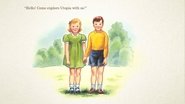James
British author Arthur C. Clarke's sci-fi is especially interested in humans evolving in response to meetings with alien intelligences and this story is no exception. It bears some resemblance to "2001" and those other "Odyssey" stories. I have not read the book (and surprise myself by being unaware of it), but it should be noted that this is another of those Clarke short story then long story issues, which means that the first ideas behind what we see here emerged as long ago as in 1946. That's obviously an interesting date, and one in which the potential of the human species to generate extreme misery was writ large. In this TV version, we move forward to the present day, but the world of 2015 is no picnic either, is it?From what I see of the descriptions of Clarke's novel, this 2015 Syfy offering from Brit Matthew Graham seems reasonably faithful to it, so in some sense we can rest assured that we are looking at high-quality science-fiction ideas actually originating from that genre's golden age. So how then do the makers manage with bringing it to the screen?Those watching the three-part miniseries will first and foremost note how everything keeps changing in it. The timespan covered here is a long one, and the three episodes witness the coming and going of key characters and - in keeping with the "evolutionary" theme - our ideas about what we're witnessing are entirely different by the time the curtain falls - as it were. Wonderfully, by the way, we Brits who love our great national composer Ralph Vaughan Williams to bits get to see just how much store should be set by his wonderful piece "The Lark Ascending" - a genius choice that matches with where the plot has come to in every possible way! Presume this is a directorial touch - and many thanks for it, Matthew!The series also ends where it begins, so in some sense is one giant flashback - though happily we are pretty much unaware of that for the entire time.Definitely, the peak achievement comes with the end of episode 1, when our unending misgivings about how utopian the utopia being shaped on Earth really is, seem to get their full vindication, and give specific corporeal form to what has so far only been the (often witty as well as calm, seductive and wise) voice of Charles Dance's Karellen. This is by far the best-known face here (in a way!), and this was an inspired choice. Other actors are mainly unknowns and their achievements here are more limited than that of Dance, and varied. One of those many aforementioned important-but-in-fact-entirely-expendable characters is that of Hugo Wainwright, as played by Colm Meaney, who narrowly avoids caricature to have his character do the necessary from the point of view of the story ... before being finished off.The lead roles played by Mike Vogel and Osy Ikhile are a bit forgettable, but that is inevitable in a film (and previous book?) whose idea is stronger than any of its characters - except Karellen, of course. This kind of approach gives the series a very specific feel of shifting sands that is entirely personified by our feelings (and those of the Earth) for Overlord (in fact one of many Overlords) Karellen. First we fear him, then welcome him, then are terrified of him, then think he's better than he looks, then fear again, then feel somehow happy when a human being abandons his own life to save the all-too-mortal alien, who later appears less and less all-powerful, and is ultimately seen to be in a less favourable position than members of the human species (or at least the children there of). It's a kind of rollercoaster that has its charms, and most of them I'm not spoiling here at all.In filming, we see homage paid to Close Encounters, Independence Day, Children of Men, The Midwich Cuckoos, Falling Skies and a great many more, and it's quite possible that newish watchers in 2015 will have no awareness of that heritage. For me it was OK, though some might be critical. In story terms, you may well end up thinking - oh no, not that idea again! Indeed, Star Trek for one drew on several of the key concepts here (e.g. about how perfect worlds might be too perfect), but Clarke's 1946 obviously predated that, as it predated a great many now-familiar sci-fi steadfasts. And any threads that we followed with foreboding - that this is not right, that humankind was not supposed to be like this - eventually get written over, as - in true Clarke style - the ending is actually optimistic as much as pessimistic, though it requires the abandonment of all we know and hold dear - except of course "The Lark Ascending", a reminder that our crude, rough-and-ready world of war and greed also creates beautiful things that presumably touch and inspire even the universal consciousness of the cosmos, should this creation of the book and film actually exist out there anywhere. The irony is of course that we would take the beauty we do create and have for granted, were it not so strongly contrasted with humankind's capacity for messing things up. Below us the chimps, above us the angels and - as Star Trek made clear - what we have is something special, however bad it may look. But Arthur C. Clarke got to this idea first, and those who watch this worthwhile version of "Childhood's End" should bear that heritage in mind.
Greg Todd
This should have been great, given the source material. But the producers discarded key plot points and crucial dialogue from the novel in order to focus on cookie-cutter emotional shtick that padded this piece out enough to fill a three part mini-series.It wasn't without its moments -some gorgeous cinematography and sound design, but the main weakness was the uneven pacing, and logical inconsistencies within the narrative.**Very mild spoiler** 15 years pass at one story break, but most characters don't age or really change in any way. At one pivotal point an important character is shot and the audience is expected to care, although the show had earlier established that the Overlords can not only stop objects mid-flight (aircraft), and stop time, but also heal bullet wounds and bring recently dead people back to life. **spoiler ends**None of the gun-play appeared in the original novel -it was all added for the TV show (you might ask why? Did the producers feel that Americans wouldn't watch a show with guns? "That's the problem with Hamlet -not enough car chases...")The religious symbolism used throughout the show was also annoyingly overplayed. It made me question whether the writers had either read or understood the original story at all.If you loved Clarke's novel, you will be angry with this clumsy adaptation. If you haven't read it, then this is an okay little series that is not particularly good or bad in any respect. Just okay. The great thing about not being familiar with the source is that you won't know how far short of its potential greatness this mini-series falls
Matthew Kresal
There are projects that seem like they will never happen. A screen adaptation of Arthur C. Clarke's classic 1953 novel Childhood's End is one of them. Stanley Kubrick tried to have a go in the 1960s but, with the rights elsewhere, the pair made the classic 2001: A Space Odyssey instead. Since then, writers and filmmakers ranging from Abraham Polonsky, Howard Koch, Philip DeGuere, and Kimberly Peirce all tried in vain to bring it to life. It wasn't until 2015, fifty- two years after original novel was published, that the SyFy Channel brought the novel to the screen through the British team of writer Matthew Graham and director Nick Hurran. Was it worth the wait?Anyone who has ever read the original novel (or virtually any of Clarke's work for that matter) will note that the novel is an epic tale but one that's not strong on plot or character. It is very much a novel of ideas and occasional incidents that build into a larger whole. Characters hardly appear or, when they do, are there for a portion of the narrative before vanishing again. All of which would make adapting it a pain for most writers. Which is something that makes Graham's adaptation all the more surprising. script does is take Clarke's ideas and build onto them. Readers will recognize many of the characters, events, and incidents from the novel being brought to life though often in new ways to match up with the fact that this is a version of Clarke's novel being made five decades after it first appeared. Wainwright and the Freedom League in the first episode is a perfect example with Graham's shifting of the character to a media baron being something that feels absolutely right, especially in the world we're living in as I write these words. Other times, it expands upon it such as the chapter in the novel where Clarke makes a multi-decade leap in a few pages which becomes the basis for a significant part of the middle episode. These changes work though some of them seem a little needless such as turning Ricky Stormgren into a young American farmer rather than the older Scandavian Secretary-General of the United Nations. On the whole though, it's a faithful adaptation of the novel in tone and philosophy at least. Beyond Graham's script, there's plenty to enjoy. The production values across the board are solid including production design and costumes that work to show not just our world reacting to the arrival of the Overlords but the world that is created in its wake. The special effects, being a science fiction tale, will get a lot of attention and they are solid as well. Indeed the effects needed to bring Clarke's novel to life have likely been as much a hurdle as the script but the combination of CGI and creature effects for the Overlords bring Clarke's vision to life splendidly. There's a large cast of actors ranging from Mike Vogel and Osy Ikhile to Daisy Betts, Ashley Zukerman, and Hayley Magnus plus a supporting cast including the ever reliable Colm Meaney and Charles Dance as the main Overlord. Brought together by veteran UK director Nick Hurran, Childhood's End tells an always compelling and interesting story. It all builds up to the ending, taken straight from the original novel and where everything from performances to effects to music all come together beautifully. The result is an assured production throughout. Yet even with all of this, it isn't a perfect adaptation. Though it's always compelling throughout, there are times when it does seem to stretching things out a bit much such as the aforementioned second episode plus early parts of the third which engage in a bit of wheel-spinning. Or, perhaps even worse, Graham's script indulges itself in clichés such as the sacrifice of one main character and a decision they make that leaves them to their fate which is something not taken from Clarke's novel. Also, despite how well the effects are for most of the series there are times when they do let it down such as the presentation of the Overlords planet which pales in comparison to the vision in Clarke's novel. Some of the casting feels a little off at times such as Julian McMahon's Doctor Boyce in the second episode and a few moments of Ikhile's performance where the right note isn't quite struck. On the whole though, the miniseries gets it right more often than not. So after five decades, was it worth the wait? I think it was. Graham and Hurran, along with a talented team in front of and behind the camera, bring Clarke's novel to life. It takes a classic novel and builds upon it, often for the better but not always, and create a take on it right for the screen and the world we live in today. It might not be on the level of Kubrick's 2001 but as TV adaptations of literary science fiction goes it is a sight better than it had any right to be.
alex-vernon
The production was remarkably true to the book, which like the first-cited reviewer I read almost a half-century ago and dearly love, except in one respect - no doubt with understandable but not forgivable artistic license, the scriptwriter in the final episode removed the dignity and eventual acceptance of the evolutionary process of the 'remaindered' humans and thus allowed the separation scenes to become - doubtless televisually attractive - those of panic and distress, at odds with Clarke's view of humanity as expressed by Karellen - that they were worth the effort. After all, the Overlords had the job of 'midwives to this process, but we ourselves are barren': they had the greatest respect, as did the writer, for their charges, who eventually deserved it.








